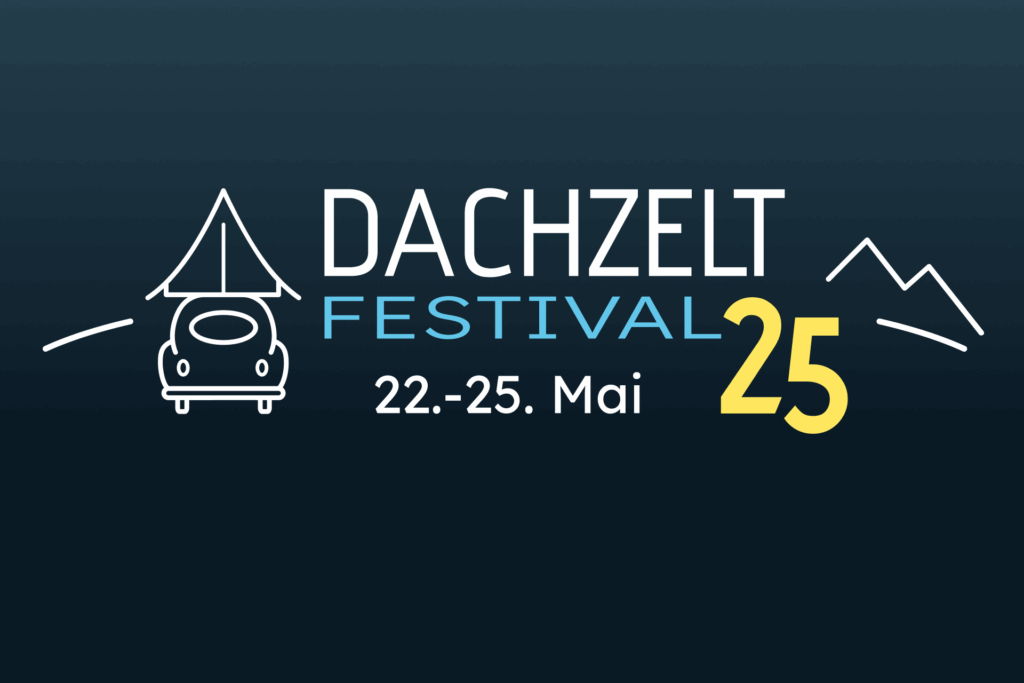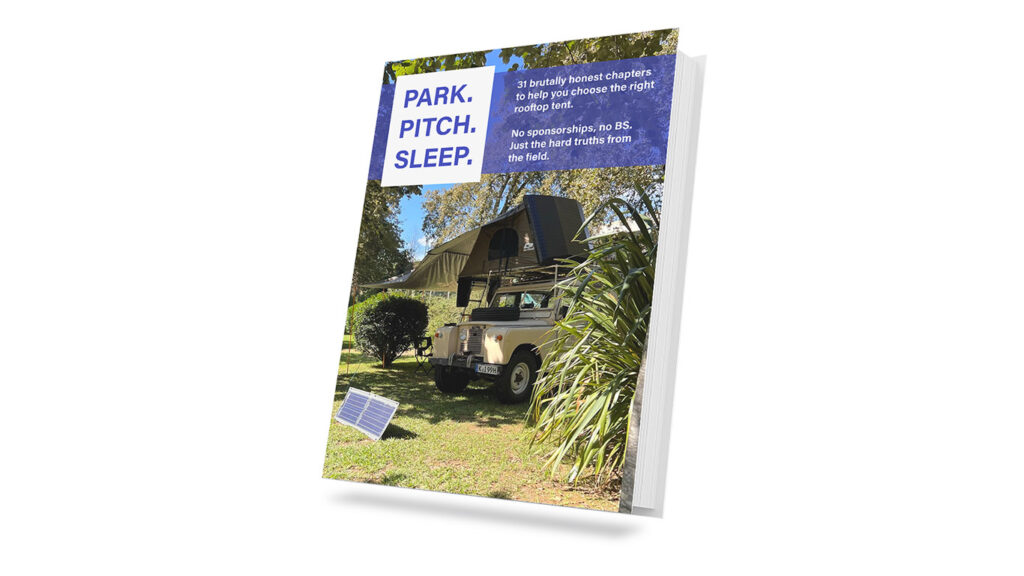When Rebecca Becker picked up the call, she was already sunlit and smiling. Somewhere south, in a mobile home parked under a blue so vivid it looked artificial. She wore a T-shirt, mid-summer casual, as if March hadn’t got the memo.
Meanwhile, I sat in Cologne. A window in front me framed the damp resignation of German spring—wet concrete, bare trees, and a sky the colour of slate. My coffee had gone cold (again).
That’s how it began.
I hadn’t invited Rebecca on for a polished PR chat. I wanted to understand how a half-crazy, half-genius idea like Dachzeltnomaden—Germany’s roaming tribe of rooftop tent fanatics—grew into a full-blown subculture. I wanted to hear how she and co-director Thilo Vogel turned a Facebook group into a movement, how they built a business around sleeping on cars, and how you keep momentum when the wind won’t let up.
But mostly, I just wanted a real conversation.
She gave me one.
Meet Rebecca, Director and Firestarter
You don’t get the sense Rebecca set out to lead anything. She sounds more like someone who says yes to an idea, then realises too late that the idea has a life of its own—and now she’s holding onto its tail, trying to steer.
She joined Dachzeltnomaden early, back when it was just Thilo and a loose bunch of gear-heads and wild campers with tents on their roofs and mud on their boots. Back then, it wasn’t a movement. It wasn’t even a plan. It was a question Thilo lobbed into the internet: Are there others like me out there?
There were. Plenty.
The first meet-up—what they later called Europe’s first rooftop tent gathering—was barely organised, barely funded, and somehow unforgettable. Rebecca helped pull the pieces together. She handled social media, lent a hand with logistics, and by the following year, she was fully in.
Not as an employee. Not even as a formal partner at first. Just someone who kept showing up.
Now she’s one of two directors, steering an outfit that runs festivals, builds semi-permanent tent villages, coordinates thousands of members across multiple platforms, and still manages to keep the firepit vibe alive. That kind of growth doesn’t happen by accident—and it sure as hell doesn’t happen without a few breakdowns along the way.
“Why Not?”—The Origin of the Dachzeltnomaden
Some people build communities. Others stumble into them.
Back in 2017, Thilo wasn’t chasing followers or revenue. He just wanted to know if he was alone. Rooftop tents were still a fringe curiosity in Germany—strapped to Land Rovers, bolted to old Toyotas, perched like gull’s nests on the roofs of muddy vans. Not quite camping. Not quite overlanding. But definitely something.
So he did what people do: he created a Facebook group and asked the digital void if anyone else out there was strapping canvas boxes to their roof and calling it freedom.
They answered.
What followed wasn’t a business plan. It was a gathering. A meet-up. A proof of life. People came, shared beers, swapped ideas, compared tents, and tried not to fall off their ladders in the dark. It was messy. And it worked.
Rebecca was there early—organising, improvising, fending off chaos with duct tape and intuition. By 2018, she was all in.
There was no office. No five-year plan. Just two people, a growing crowd, and a sense that something was happening that they couldn’t quite control. What began as a shared interest quickly became a shared identity.
Beyond the Tent: From Events to Ecosystem
Somewhere along the way, it stopped being a weekend hobby.
Now it’s a full-blown ecosystem.
The numbers are slippery, depending on who’s counting, and how; but they go like this: over 50,000 in the Facebook group, 70,000+ on Instagram, YouTube, WhatsApp groups, events with 2,000 people showing up in a field to talk tents and torque wrenches. What started as a “hey, is anyone else into this?” has grown into one of the most vibrant outdoor communities in Germany.
But it’s not just events. It’s infrastructure.
There’s a full-time team—five core staff, not counting Rebecca and Thilo—and an extended crew of around 20 volunteers who step in when the camps go live. They run social, manage tech, negotiate with campsites, deal with sponsors, and somehow still find time to answer newbie questions about roof load limits and ladder lengths.
And then there are the Dachzeltdörfer—rooftop tent villages. Imagine treehouses without the trees. Fixed wooden platforms. Roof tents bolted into place. Some in the forest. Some in maize fields. Some on floating pontoons in the water. One sits tucked into the dunes of Amrum, where no vehicles are allowed but the tents are waiting anyway, like secret hideouts for grown-up kids who never stopped camping.
They’re not gimmicks. They’re test labs. Before dropping three grand on a rooftop tent, you can go spend a night in one—bring the family, drink by the fire, see if your spine agrees with the sleeping pad. That was the idea. That you should feel it before you buy it. Turns out, a lot of people agreed.
And because this is still Germany, and someone has to keep the spreadsheets tidy, they’ve turned it into a franchise system. Partnerships with campgrounds, standardised setups, even add-on pitches for people bringing their own tents. It’s clever. And it works.
Spanners, Sponsors & Spaghetti Logistics
Ask anyone who’s tried to scale a community, and they’ll tell you: there’s a point where passion turns into paperwork. And it doesn’t always happen gently.
In their early years, Rebecca and Thilo did what all stubborn visionaries do. They overcommitted. In one year, they ran ten events. Ten. Five of them were non-profit—just for the love of it, the buzz of it, the wide-eyed thrill of pulling something improbable off with zero sleep and half a plan.
They ran the website. Managed social. Built the Dachzeltdörfer. Slept in vans. Lived off firelight and Wi-Fi. Somehow, they didn’t implode.
But they came close.
COVID, ironically, saved them. The lockdowns hit pause on the chaos. Events were off. Travel was out. And for the first time in years, they had space to think.
“We were running on 24/7 mode,” Rebecca told me. “It was insane. Now we’ve got full-timers capped at 35 hours a week. Work-life balance actually means something.”
And it shows.
Out of the COVID fog came something more stable. More sustainable. They restructured. Diversified income. Turned Dachzeltdörfer into franchise deals that could weather storms. Dialled in their event model. Took a scalpel to the madness. Not to kill the spirit—but to make sure it didn’t burn itself out.
They still run on chaos, of course. Just better managed chaos. With contracts and insurance and enough toilet facilities to handle 2,000 people and a slip-and-slide.
And sponsors? Yes, they play a part—but not in the old-fashioned, logo-smearing way. Manufacturers can book ad space on the site or socials. But inside the community itself? Strict rules. No spam. No brand hype. No special treatment. Even the brands know it—if they want to know what’s going wrong with their gear, they’d better lurk quietly in the comments like everyone else.
Italy, Visibility & the Future
Dachzeltnomaden isn’t just a German thing anymore.
They’ve held events in Switzerland, Austria, the Netherlands—and now, for the first time, they’re heading into Italy. Not as tourists. As co-hosts. Partnering with the Italian rooftop tent community to create something that’s not just a German export with better coffee.
Sure, 90% of the tickets so far have been sold to Germans. But the intent is there—to build something rooted in collaboration, not colonisation. That matters.
“We didn’t want to be the loud Germans rolling in and taking over,” Rebecca said. “So we reached out. And they said yes.”
That shift—from local to international, from community to network—runs parallel to another push: visibility. After a year of rebuilding the website from the inside out, this year’s mission is SEO. Not the flashy kind. The useful kind. The kind that puts answers at the top of the search results because they’re good, not because they’re crammed with keywords.
“I want people to find us because what we offer is worth finding,” Rebecca said.
There’s talk of YouTube collaborations. DIY tutorials. Gear walkthroughs. Even AI is on the radar. Not just for the sake of it—but to help distil years of community knowledge into something searchable and sharp.
But the core remains the same: real info, real people, real-world experience.
And that’s what sets them apart. It’s not just about tents. They’re building a culture—one that values curiosity over clicks, conversations over conversions.
The Big Camp in May
If you want to understand what Dachzeltnomaden really means, don’t scroll. Show up.

From May 22nd to 25th, their flagship event takes place—2,000 people, one giant camp area, and not a dull patch of grass in sight. It’s a collision of vans, tents, trucks, families, loners, DIY obsessives, Instagram escapees, muddy dogs, actual children, rooftop gear-heads, and the kind of people who show up with a beer in one hand and a socket set in the other.
It’s called the Dachzeltnomaden Festival. But that’s underselling it.
There are workshops, talks, and a full-blown Händlermeile—a vendor strip where you can test tents, poke around new accessories, or haggle over gadgets you didn’t know you needed. There’s food—real food—not just limp bratwurst and pre-packed pasta, but real trucks, with real flavour. There’s a kids’ area. There’s a giant water slide. There are lectures and late-night fires. There’s even a “creative corner” where someone might be selling honey next to a table of essential oils and handmade knives.
And there are toilets. Proper ones. With showers.
You don’t need a rooftop tent to come. Hell, you don’t even need a tent. Just bring some curiosity, maybe an open mind, and you’ll be fine.
Rebecca calls it a family reunion of people who’ve never met.
And she’s not wrong.
The thing is, Dachzeltnomaden isn’t about tents. It never was. It’s about what happens when you step out of your daily grind, and meet other people doing the same.
The gear will change. The platforms will evolve. The SEO campaigns will come and go.
But the feeling? The buzz of standing in a field full of strangers who feel like old friends?
That’s the bit they’ve nailed. And that’s why they’ll still be here when the next big camping trend has packed up and gone home.






